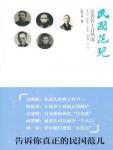Chapter 1 1. Gu Hongming
Gu Hongming once summarized his life as: "I was born in Nanyang, studied in the West, married in the East, and served in Beiyang."
Gu Hongming is proficient in nine languages including English, French, German, Latin, Greek, and Malay, and has obtained 13 doctoral degrees in literature, philosophy, science, and divinity; he is the first to translate Chinese Confucian classics such as "The Doctrine of the Mean" into English and German, spread to the West by Chinese scholars.
Gu Hongming was born in a prominent overseas Chinese family in Penang Island in the northwest of the Malay Peninsula. His grandfather held an important position in the Kedah government. His father, Gu Ziyun, ran a rubber plantation for the British businessman Brown. He could speak Hokkien, English, and Malay. Said as Portuguese), English and Portuguese.The Gu family has always used English and Hokkien as their home languages, which laid the foundation for Gu Hongming to master multiple languages in the future.
Brown, the owner of the rubber plantation, had no children, so he adopted Gu Hongming as his adopted son, and then brought him to England to receive education.Gu Hongming was admitted to the University of Edinburgh with excellent grades, and was appreciated by the principal of the school, famous writer, historian and philosopher Carlyle, and became his disciple.
In 1877, after the 21-year-old Gu Hongming obtained a Master of Arts degree from the University of Edinburgh, Brown sent him to the University of Leipzig in Germany to study civil engineering.A year later, Koo obtained a diploma in civil engineering.
According to Zhao Wenjun, after graduating from the University of Leipzig, Gu Hongming went to the University of Paris to study French.Brown rented three rooms in a prostitute's apartment for him, and let him live next to the famous prostitute, so that he could learn French and learn more about the world.In this way, Gu learned about the tricks of politicians, soldiers, and wealthy businessmen, and also met Vadsi, the later commander of the Eight-Power Allied Forces.At that time, Waldsee was a candy seller and wanted to learn German before returning to Germany to join the army. Gu Hongming taught him German for three years.After the Gengzi Rebellion, Gu Hongming once mediated with Vadsey and others and participated in the peace talks.
Scholar Zhu Weizheng believes that Zhao Wenjun's records are "full of absurd statements."However, Gu Hongming did play a role in the peace talks of the Eight-Power Allied Forces invading China. "The History of the Qing Dynasty Biography of Gu Tangsheng" said: "Gengzi boxing chaos, the Allied Forces committed crimes in the north. Tang Sheng used English cursive "Zunwang Pian" to apply for righteousness. Great powers know China To build a country with rites and teachings, we should never be insulted, and peace talks are the way to go." There were also rumors in Beijing at that time: "After the Boxer indemnity, if there is no Gu Hongming to support the country's facade, Westerners will regard the Chinese as if they don't even have a nose!"
Before Gu Hongming, Yung Wing was the only one who went to the West to study, and Gu was the first person to study in Europe.In his later years, when he was giving lectures in Japan, he claimed to be "the oldest Chinese educated person in Europe".
In 1883, Gu Hongming published an article "Chinese Studies" in the English-language newspaper "North China Daily". Since then, he has embarked on the road of promoting Chinese culture and mocking Western learning.
Gu Hongming served in Zhang Zhidong's shogunate for 20 years. While helping Zhang to coordinate the Westernization, he also studied Chinese culture.After Zhang's death, Gu wrote "The Chinese Oxford Movement" to commemorate Zhang and compared Zhang with Cardinal Newman. Apart from sighing, he feared that evil forces would win in China and Europe. In 1911, the German sinologist Werewell translated the book into German and renamed it "Defending China Against European Ideas: A Critical Essay", which was listed as a must-read book for teachers and students of the Department of Philosophy by the University of Göttingen.
At the beginning of the 20th century, Gu Hongming published "Notes on China" five times, emphasizing the value of oriental civilization. In 1915, Gu Hongming's "Spring and Autumn Days" (that is), was published, which sharply criticized Western civilization and believed that only Chinese culture could save the world.After the German version of the book was published, it caused a huge sensation in Germany, which was in the midst of World War I.
Gu Hongming once gave a lecture "The Spirit of the Chinese People" (Chunqiu Dayi) in English at the Liuguo Hotel in Dongjiaomin Lane.At that time, there had never been a precedent for selling tickets for speeches by Chinese people, but Gu insisted on selling tickets, and the ticket price was higher than that of Mei Lanfang, the head of the "Four Famous Danes".Tickets for Mei Lanfang are 1 yuan and 2 cents, and listening to Gu's speech costs 2 yuan, but foreigners still flock to them, which shows its popularity.
At the beginning of the 20th century, there were only two oriental cultural figures recognized by the West: Rabindranath Tagore in India and Gu Hongming in China.They were also nominated for the 1913 Nobel Prize in Literature, which Tagore won.

